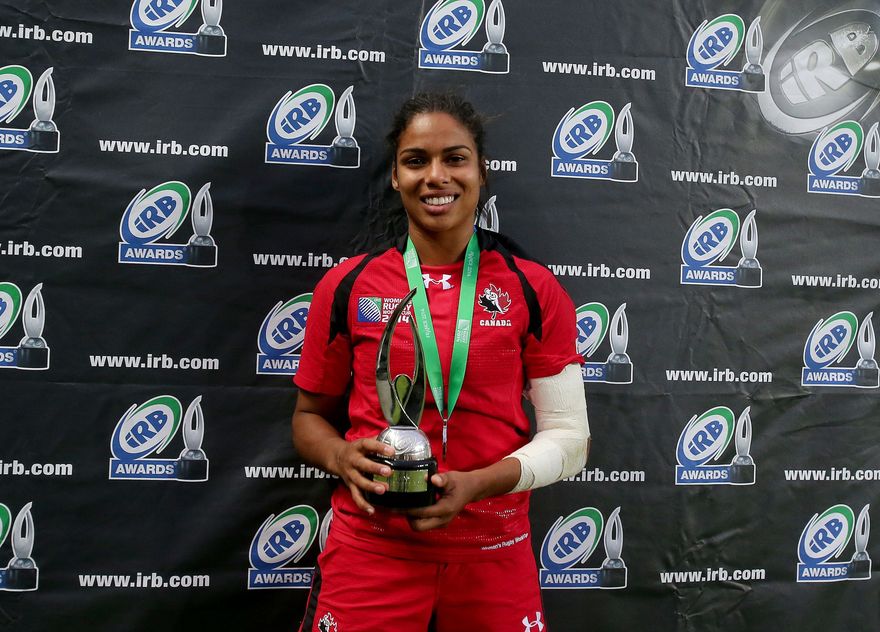IRB Women's Development Manager Su Carty talks about Impact Beyond WRWC 2014 and the projects already up and running in participating countries to capitalise on the momentum created by the tournament.
With the dust only settling on a record-breaking Women’s Rugby World Cup 2014 in France, the International Rugby Board are eager to ensure that the tournament has a lasting legacy on the development of the game for women and girls in the participating unions and beyond.
A key element of that legacy will be the IRB’s Impact Beyond programme, which is designed to inspire and enable more people around the world to participate and enjoy the game of Rugby and uses IRB tournaments as a catalyst for the growth of the Game.
Impact Beyond WRWC 2014 was therefore designed to drive the participation and profile of women and girls in participating unions, all 12 of whom were invited to complete the programme.
Nine projects are already up and running with others due to start projects in the months after the tournament which raised the bar to new heights in terms of record crowds, TV viewing figures and media coverage.
There were a number of initiatives ranging from Women’s Rugby World Cup 2014 promotion in Paris to participation projects in South Africa and Ireland.
'Give it a Try!'
The Impact Beyond WRWC 2014 Conference was organised on the eve of the WRWC 2014 final between England and Canada, making the most of the opportunity to bring Union representatives together to discuss the development of the women’s game and identify actions to ensure the momentum continues.
Our hosts, the Fédération Française de Rugby, presented their Impact Beyond project which centred around promoting the tournament in the centre of Paris at the Hotel de Ville ahead of the launch and start of WRWC 2014.
The Irish Rugby Football Union shared their project which targets increasing participation of girls under the age of 12 by developing a girls specific mini rugby programme as part of their 'Give it a Try' women's rugby programme.
New Zealand Rugby ran a tournament-based initiative engaging Pacific Islanders residing in New Zealand, which succeeded in bringing new players into the Game and highlighted benefits of a tournament approach run over four weeks to retain players, as opposed to a league over a number of months which may not be attractive to all girls wanting to play.
The stars of women’s rugby are, and will continue to be, at the centre of the programme as they join events to lend a hand with coaching children, while also being ambassadors for the various projects across the Unions.
The one-day conference captured lots of activity kicking off in Unions as a result of Women's Rugby World Cup 2014 and also energised delegates to consider where further work is required.
Making the most of opportunities
Delegates discussed best practice around increasing participation and progressing participation pathways. The importance of introducing participation programmes like the IRB’s Get Into Rugby as part of the Union strategy for women’s rugby development was strongly emphasised.
Specifically targeting girls and introducing girls’ specific programmes is proving effective in increasing participation in some Unions. Progressing participation pathways specific for girls, ensuring they can start and continue to play at levels appropriate for them regardless of age with avenues into coaching, refereeing and administration was discussed in depth and is crucial to further develop the Game.
The participating Unions were not the only ones attending the conference with the BBC’s Sara Orchard, Alison Donnelly from women’s rugby website scrumqueens.com, Nicolas Poncy and Julia Hutton from the FFR and RFU communications departments respectively.
They led a discussion on how to effectively promote the Women’s Game. As well as sharing tips on how to share their messages and stories, they highlighted the importance of maximising the success of the World Cup.
They advised Unions to ensure they have a website in place that is kept up to date. They also emphasised the importance of utilising social media and encouraged delegates to build relationships with people who can help share their story and message.
The conference finished with a look ahead to the next Women’s Rugby World Cup which will be held in 2017 with confirmation that the tender process timelines and qualification process will be advised by the end of the year.
-
Fixtures & ResultsFixtures & Results
-
Inside World RugbyInside World Rugby
-
NewsNews
Website language
English
- English
- Français
- Español
- 日本語
Ensuring an Impact Beyond WRWC 2014
IRB Women's Development Manager Su Carty talks about the Impact Beyond WRWC 2014 programme.
-
label.share.via_facebook
-
label.share.via_twitter
-
label.share.via_facebook_messenger
-
label.share.via_whatsapp
-
label.share.via_copyURL Copied
Fri
29
August,
2014

Last updated: Aug 29, 2014, 4:10:27 PM
